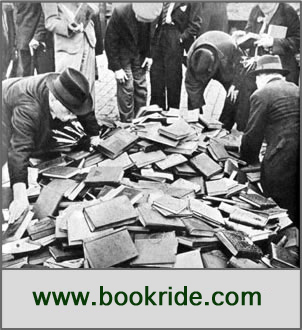'We know it as Bromo Bombasts by Laurence Durrell. There's a copy in the BM, another in the Library of Congress; the collector of Durrell had one and I vaguely heard that Martin Stone had found another. Someone offered me a copy in appalling condition- it looked as if it had been draggedup from the sea or something. I said, well, I'll give you a £100, because you could just about read the thing- to which the bloke announced, "I've been offered a grand." So I told him to take it!"
Then there's The Girls of Radcliff Hall, by 'Adela Quebec'- in real life a great book and a rare one by Lord Berners, who obviously took the title from the name of the notorious lesbian novelist. 'It will cost you £2,000 and if you want one Maggs have got a copy,' Burwood says. 'It never shows up in great condition. It's another roman a clef. Everyone in it is a real person disguised and the reason it is rare is that those portrayed in it bought up copies and destroyed them because they felt Berners had shown them up in bad light. Cecil Beaton was especially incensed, but there's no doubt that he deserved his treatment by Berners.'
A famous pseudonym sleeper is No Decency Left by Barbara Rich, a novel of 1932 written mainly by Laura Riding, but containing contributions by her partner Robert Graves and a chapter by TE Lawrence. 'When Laura Riding was up there with Sylvia Plath it used to be a two thousand quidder, but nowadays most people find Riding very hard going. However, it's still a good find. You can find expensive copies on the net today, whereas years ago the book could be picked up for a couple of quid.'
One of the most famous sleepers is Henry Music, a work put together by Nancy Cunard and published by the Hours Press. 'This not only contains Samuel Beckett's first appearance in a book,' Burwood points out,' but features a cover by Man Ray. It's a simply fabulous book and usually goes
 for $10,000. However, I know someone who needed a copy of the book... He went online to the usual specialist booksites. No luck. He then went on eBay and struck lucky. However, the vendor hadn't mentioned anything about Beckett or anyone else. All he said was that "I think it's from the 1930s." This person bought it for nine and a half euros! Nine and a half!'
for $10,000. However, I know someone who needed a copy of the book... He went online to the usual specialist booksites. No luck. He then went on eBay and struck lucky. However, the vendor hadn't mentioned anything about Beckett or anyone else. All he said was that "I think it's from the 1930s." This person bought it for nine and a half euros! Nine and a half!' ... it was time for one of Burwood's favourite sleepers. A Gent from Bear Creek was the first book by Robert E. Howard, who went on to write Conan the Barbarian. It appeared in 1937 from Jenkins, who specialised in adventure stories, but who also published Wodehouse. Most copies were destroyed for some reason and Howard himself died young. But since his death, he has become a cult figure with whole books and comics being written in his style. 'I got £3,000 for a not very nice copy with no jacket,' he says,' but a good one would set you back over double that sum today.'
'Black literature is also collectable and there's a slim volume of poetry by Claude Mckay called Spring in New Hampshire which appeared in 1920 and which now fetches a thousand quid. I recall going into this bookshop in Virginia Waters run by a British nationalist Party member. There was a bloke sitting behind the counter reading some Nazi newspaper called Stormstrooper, or something. I found this particular book on a shelf and in it he had written "thirty pence". I left the shop with it and sold it on the blower for £200... to be continued with further tall tales, boasts and blagues...


2 comments:
Hi Nigel. I saw your comment & blog link on cartoon brew. Right below mine perhaps that's how you found it. You do an immensely enjoyable blog. I read anything helpful trying to step up jobs I do. (animation and book selling.) self employment is hard in pricey san francisco.
A book published by Herbert Jenkins in 1937- such as A Gent from Bear Creek- may have had many copies dextroyed in the Blitz in 1940-41. Books from the 1930s- especially the late 1930s- which only had one edition are often hard to come by for that reason. Many books were also pulped and the paper recycled in the war too.
Post a Comment